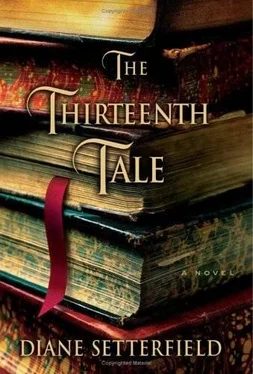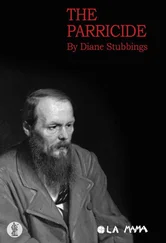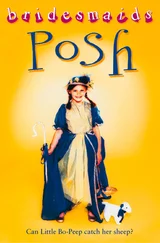I reread the letter. Brisk and sensible, it betrayed nothing of my fear. Dawn was breaking. The trembling had stopped. Soon Judith would be here with breakfast.
There was nothing the new governess couldn't do if she put her mind to it.
That's how it seemed at first, anyway.
But after a time difficulties did begin to emerge. The first thing was her argument with the Missus. Hester, having tidied and cleaned rooms and left them locked behind her, was put out to discover them unlocked again. She called the Missus to her. "What need is there," she asked, "for rooms to be left open when they are not in use? You can see what happens: The girls go in as they please and make chaos where there was order before. It makes unnecessary work for you and for me."
The Missus seemed entirely to concur, and Hester left the interview quite satisfied. But a week later, once again, she found doors open that should have been locked, and with a frown called the Missus once again. This time she would accept no vague promises but was determined to get to the heart of the matter.
"It's the air," explained the Missus. "Without the air moving about, a house gets dreadful damp."
Hester gave the Missus a succinct lecture in simple terms about air circulation and damp and sent her away, certain that this time she had solved the difficulty.
A week later she noticed again that doors were unlocked. This time she did not call the Missus. Instead she reflected. There was more to this problem of door-locking than met the eye. She resolved that she would study the Missus, discover by observation what lay behind the unlocking of doors.
The second problem involved John-the-dig. His suspicion of her had not escaped her notice, but she was not put off. She was a stranger in the house, and it was up to her to demonstrate that she was there for the good of all and not to cause trouble. In time, she knew, she would win him over. Yet though he seemed to get used to her presence, his suspicion was unexpectedly slow to fade. And then one day suspicion flared into something else. She had approached him over something quite banal. In our garden she had seen, or so she maintained, a child from the village who should have been at school. "Who is the child?" she wanted to know, "Who are his parents?"
"Nothing to do with me," John told her, with a surliness that took her aback.
"I don't say it is," she responded calmly, "but the child should be in school. I'm sure you'll agree with me on that. If you will just tell me who it is, then I will speak to the parents and the schoolmistress about it."
John-the-dig shrugged his shoulders and made to leave, but she was not a woman who would be put off in this manner. She darted around him, stood in front of him and repeated her demand. Why should she not? It was an entirely reasonable one and she was making it in a civil fashion. Whatever reason would the man have to refuse?
But refuse he did. "Children from the village do not come up here" was his only response.
"This one did," she went on.
"They stay away out of fear."
"That's ridiculous. Whatever do they have to be afraid of here? The child was in a wide-brimmed hat and a man's trousers cut down to fit. His appearance was quite distinctive. You must know who he is."
"I have seen no such child," came the answer, dismissively, and once again John made to leave. Hester was nothing if not persistent. "But you must have seen him-" "It takes a certain kind of mind, Miss, to see things that aren't there.
Me, I'm a sensible fellow. Where there is nothing to see, I see nothing. If I were you, Miss, I would do the same. Good day to you."
With that he left, and this time Hester made no attempt to block him. She simply stood, shaking her head in bewilderment and wondering what on earth had got into the man. Angelfield, it seemed, was a house full of puzzles. Still, there was nothing she liked more than mental exercise. She would soon get to the bottom of things.
Hester's gifts of insight and intelligence were quite extraordinary. Yet counterbalancing these talents was the fact that she did not know quite who she was up against. Take for instance her habit of leaving the twins to their own devices for short periods while she followed her own agenda elsewhere. She watched the twins closely first, evaluating their moods, weighing up their fatigue, the closeness to mealtimes, their patterns of energy and rest. When the results of this analysis told her the twins were set for an hour of quiet indoor lolling, she would leave them unattended. On one of these occasions she had a special purpose in mind. The doctor had come and she wanted a particular word with him. Aprivate word.
Foolish Hester. There is no privacy where there are children.
She met him at the front door. "It is a nice day. Shall we walk in the garden?"
They set off toward the topiary garden, unaware that they were being followed.
"You have worked a miracle, Miss Barrow," the doctor began. "Emmeline is transformed."
"No," said Hester.
"Yes, I assure you. My expectations have been more than fulfilled. I am very impressed."
Hester bowed her head and turned her body fractionally away from him. Taking her response for modesty, he fell silent, thinking her overwhelmed by his professions of esteem. The newly clipped yew gave him something to admire while the governess recovered her sangfroid. It's just as well he was engrossed in its geometric lines, else he might have caught her wry look and realized his error.
Her protesting "No" was far from being the feminine simpering that the doctor took it for. It was a straightforward statement of fact. Of course Emmeline was transformed. Given the presence of Hester, how could it have been otherwise? There was nothing miraculous about it. That is what she meant by her "No."
Yet she was not surprised by the condescension in the doctor's comment. It was not a world in which signs of genius were likely to be noticed in governesses, but nonetheless I think she was disappointed. The doctor was the one person at Angelfield, she thought, who might have understood her. But he did not understand her.
She turned toward the doctor and found herself facing his back. He stood, hands in pocket, the line of his shoulders straight, looking up to where the yew tree ended and the sky began. His neat hair was graying, and there was a perfect circle of pink scalp an inch and a half wide on the top of his head.
"John is making good the damage that the twins did," Hester said.
"What made them do it?"
"In Emmeline's case that is an easy question to answer. Adeline made her do it. As for what made Adeline do it, that is a harder question altogether. I doubt she knows herself. Most of the time she is governed by impulses that appear to have no conscious element. Whatever the reason, the result was devastating for John. His family has tended this garden for generations."
"Heartless. All the more shocking coming from a child."
Unseen by the doctor, she pulled another face. Clearly he did not know much about children. "Heartless indeed. Though children are capable of great cruelty. Only we do not like to think it of them."
Slowly they began to walk between the topiary shapes, admiring the yews while speaking of Hester's work. Keeping a safe distance, but always within earshot, a little spy followed them, moving from the protection of one yew to another. Left and right they moved; sometimes they turned to double back on themselves; it was a game of angles, an elaborate dance.
"You are satisfied with the results of your efforts with Emmeline, I imagine, Miss Barrow?"
"Yes. With another year or so of my attention, I see no reason why Emmeline should not give up unruliness for good and become permanently the sweet girl she knows how to be at her best. She will not be clever, but still, I see no reason why she should not one day lead a satisfying life separately from her sister. Perhaps she might even marry. All men do not seek intelligence in a wife, and Emmeline is very affectionate."
Читать дальше












